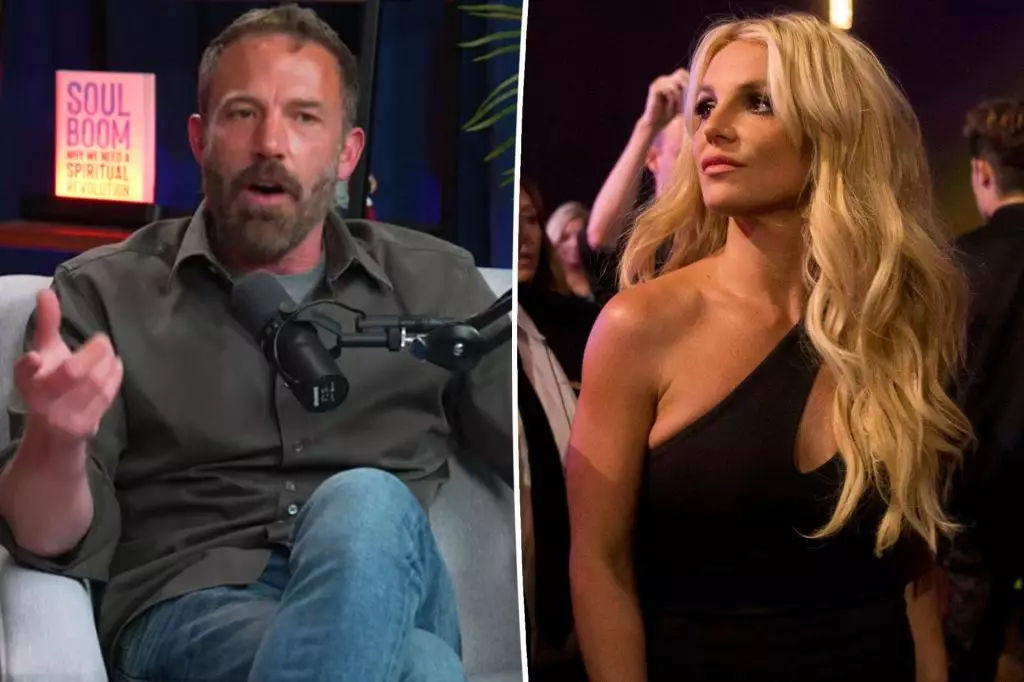In the unforgiving realm of the entertainment industry, the line between fame and the relentless scrutiny that accompanies it becomes dangerously thin. Recently, Ben Affleck shared his reflections on this very subject during an episode of “This Past Weekend With Theo Von,” admitting his past empathy for Britney Spears as she faced a barrage of paparazzi attention amidst challenging circumstances. This admission is not merely a nostalgic recollection; it forces us to confront the broader implications of celebrity culture and the entrenched cruelty that often accompanies it.
Affleck’s recognition of the “collective cruelty” present in the relentless pursuit of high-profile individuals illuminates a troubling aspect of modern life. Spears, once a pop icon at the pinnacle of her career, became a target for relentless media scrutiny at a time when she was visibly struggling. The psychological toll of being both a celebrity and a victim of public fascination is a harrowing reality. When Affleck suggests that the imagery of celebrities reflects only their “growling” moments—moments often provoked by invasive photographers—it raises critical questions about our entertainment consumption. Are we complicit in perpetuating this cycle of suffering, and is there a point where our fascination with starlet drama morphs into something morally deplorable?
A Historical Context of Media Ethics
To understand Affleck’s sentiments, one must consider the historical context of media ethics, particularly during what may be regarded as the ‘sell-out era’ of celebrity journalism in the early 2000s. Britney Spears is synonymous with that period, characterized by sensationalist headlines, invasive coverage, and the tragic downfall of many high-profile individuals under the relentless gaze of the media. Events surrounding Spears’ infamous 2007 breakdown serve as poignant reminders of the dangers inherent in a culture that ceaselessly commodifies personal hardship. As much as we may admire the glamour of celebrity, we must question the means by which these individuals are kept afloat—or, in too many instances, forced into the depths of despair.
Affleck himself has been no stranger to media scrutiny. His rise to fame has not been without its controversies; thus, when he speaks on behalf of Spears, one cannot help but wonder if his empathy is reflective of his own past encounters with invasive journalism. His admission demonstrates a level of self-awareness, sparking discussions about personal responsibility in the dynamic between public figures and the press. In light of this cyclical harassment, as audiences, we must scrutinize what compels us to consume such narratives.
The Ripple Effect of Celebrity Trauma
The psychological consequences of media harassment extend beyond the celebrity in question; they ripple throughout society, shaping perceptions of mental health and the stigma that accompanies it. Affleck’s comments hint at a societal reckoning, where celebrities like Spears serve as cautionary tales regarding the human condition’s vulnerability under public scrutiny. When public figures are dehumanized into mere spectacles, the serious implications for mental health are often overlooked.
Britney Spears’ journey from pop queen to a tragedy highlighted the fragility of celebrity personas. After being placed into a conservatorship, her story highlighted the public’s negligence toward the emotional well-being of those they idolize. Affleck’s acknowledgment of the psychological strain on Spears invites a conversation about the obligations we hold—not just as consumers of media but as empathetic individuals. Should we not strive towards a culture that respects boundaries and advocates for mental health rather than exploiting it for entertainment?
Speculation and Relationships: A Mixed Bag
Interestingly, Affleck also touched upon claims made by Spears regarding their alleged kiss years ago. While such playful mischief may seem trivial, it underscores a recurring theme of confusion between mythologizing personal connections and maintaining privacy. Celebrity relationships often attract speculation, transforming moments of intimacy into fodder for public consumption. In this case, Affleck’s careful evasions reveal an understandable reluctance to engage in public narratives that distort private experiences.
The implications of such engagements challenge us to consider how we discuss and analyze personal experiences in the public sphere. Are we inadvertently shaping histories that may not genuinely reflect the truth? As consumers of celebrity culture, we must tread carefully, recognizing that our fascination often straddles the line between admiration and intrusion.
Affleck’s reflections on Britney Spears are a potent reminder that behind every image in a magazine or online lurks a human being grappling with their struggles—struggles that deserve more compassion than curiosity.

